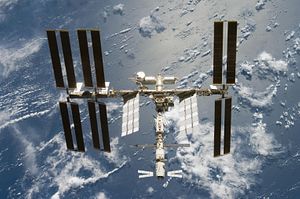As U.S.-Russia relations reach their lowest point since the Cold War over the crisis in Ukraine and Russia’s decision to annex Crimea, both sides have been keen to punish the other for what they perceive as unjustified and inappropriate behavior on the international stage. The United States has already hit several high-profile Russian individuals and firms with sanctions in an attempt to increase the costs of Russia’s decision to annex Crimea and foment unrest in eastern Ukraine. Russia, for its part, does not have the economic clout to play tit-for-tat with the United States on economic sanctions, but it has moved to hurt the United States’ space program by denying the United States access to the International Space Station (ISS) beyond 2020.
The ISS is the single most expensive structure constructed by humanity, at a cost of around $150 billion. The United States’ National Aeronautics and Space Administration (NASA) footed a plurality of the cost to construct the ISS, contributing around $58.7 billion plus the costs of the 36 space shuttle flights that were required to construct the installation. Russia footed $12 billion of the ISS’s budget. Despite the United States’ contributions to the ISS, Russia is able to bar the United States from accessing the station by denying NASA access to Russian rocket engines, which are used to transport goods and personnel into space and back. In particular, the only way to reach the station right now is Russia’s Soyuz spacecraft. After discontinuing its own space shuttle program, NASA has no immediate way of reaching the ISS without years of research and development of a new space-travel platform.
Recently, private space-faring companies such as Elon Musk’s SpaceX have made important advances in their ability to interface with the ISS and send goods and personnel into space. It may eventually be possible for the United States to reach the ISS via other means. Musk has hinted at his willingness to work with the United States government to replace Russia’s ISS transport services. Prior to making its announcement about denying the United States access to the ISS, Russian Deputy Prime Minister Dmitry Rogozin warned the United States on Twitter: “After analyzing the sanctions against our space industry, I suggest to the USA to bring their astronauts to the International Space Station using a trampoline.” Musk responded: “Sounds like this might be a good time to unveil the new Dragon Mk 2 spaceship that @SpaceX has been working on w @NASA. No trampoline needed.”
Regarding the operations of the ISS, Rogozin noted that “The Russian segment of the ISS can exist independently from the U.S. one, but the U.S. segment cannot exist independently from the Russian one.” According to Rogozin, Russia would also stonewall a U.S. request to keep the ISS operating beyond its original 2020 deadline. The United States wants to extend operation until 2024. Rogozin hinted that future cooperation between Russia and the United States on high technology more broadly might be limited: “We are very concerned about continuing to develop high-tech projects with such an unreliable partner as the United States, which politicizes everything.”
The ISS was a symbol of successful cooperation between the United States and Russia following the Cold War. Russia’s decision to deny the United States access to the station symbolically puts an end to that post-Cold War state of affairs. The announcement won’t affect the fates of the one U.S. astronaut and two Russian cosmonauts currently aboard the station or missions in the next few years. Theoretically, there could be time for the United States and Russia to reach a diplomatic settlement once the situation in Ukraine stabilizes.

































